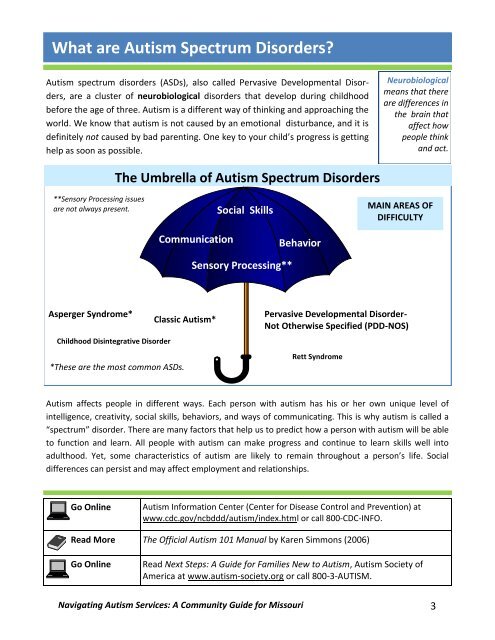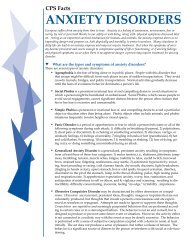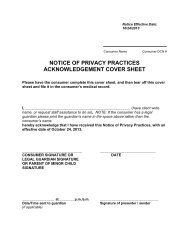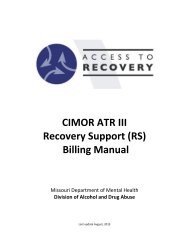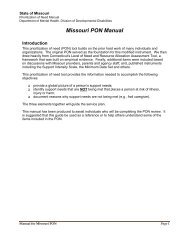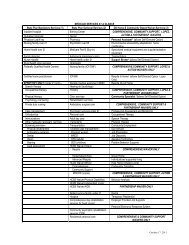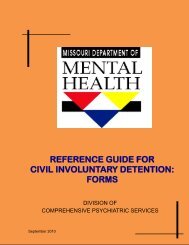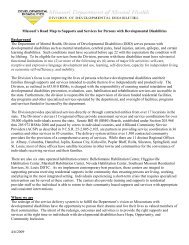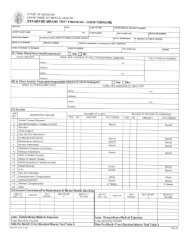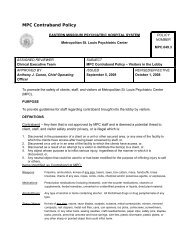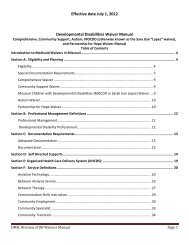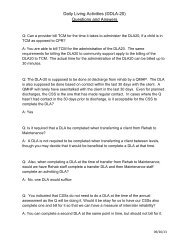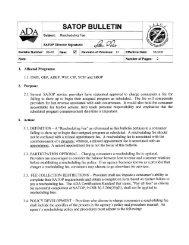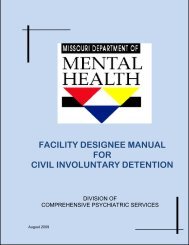Navigating Autism Services - Missouri Department of Mental Health
Navigating Autism Services - Missouri Department of Mental Health
Navigating Autism Services - Missouri Department of Mental Health
Create successful ePaper yourself
Turn your PDF publications into a flip-book with our unique Google optimized e-Paper software.
What are <strong>Autism</strong> Spectrum Disorders?<strong>Autism</strong> spectrum disorders (ASDs), also called Pervasive Developmental Disorders,are a cluster <strong>of</strong> neurobiological disorders that develop during childhoodbefore the age <strong>of</strong> three. <strong>Autism</strong> is a different way <strong>of</strong> thinking and approaching theworld. We know that autism is not caused by an emotional disturbance, and it isdefinitely not caused by bad parenting. One key to your child’s progress is gettinghelp as soon as possible.Neurobiologicalmeans that thereare differences inthe brain thataffect howpeople thinkand act.The Umbrella <strong>of</strong> <strong>Autism</strong> Spectrum Disorders**Sensory Processing issuesare not always present.Social SkillsMAIN AREAS OFDIFFICULTYCommunicationBehaviorSensory Processing**Asperger Syndrome*Classic <strong>Autism</strong>*Childhood Disintegrative Disorder*These are the most common ASDs.Pervasive Developmental Disorder-Not Otherwise Specified (PDD-NOS)Rett Syndrome<strong>Autism</strong> affects people in different ways. Each person with autism has his or her own unique level <strong>of</strong>intelligence, creativity, social skills, behaviors, and ways <strong>of</strong> communicating. This is why autism is called a“spectrum” disorder. There are many factors that help us to predict how a person with autism will be ableto function and learn. All people with autism can make progress and continue to learn skills well intoadulthood. Yet, some characteristics <strong>of</strong> autism are likely to remain throughout a person’s life. Socialdifferences can persist and may affect employment and relationships.Go Online<strong>Autism</strong> Information Center (Center for Disease Control and Prevention) atwww.cdc.gov/ncbddd/autism/index.html or call 800-CDC-INFO.Read More The Official <strong>Autism</strong> 101 Manual by Karen Simmons (2006)Go OnlineRead Next Steps: A Guide for Families New to <strong>Autism</strong>, <strong>Autism</strong> Society <strong>of</strong>America at www.autism-society.org or call 800-3-AUTISM.<strong>Navigating</strong> <strong>Autism</strong> <strong>Services</strong>: A Community Guide for <strong>Missouri</strong>3


